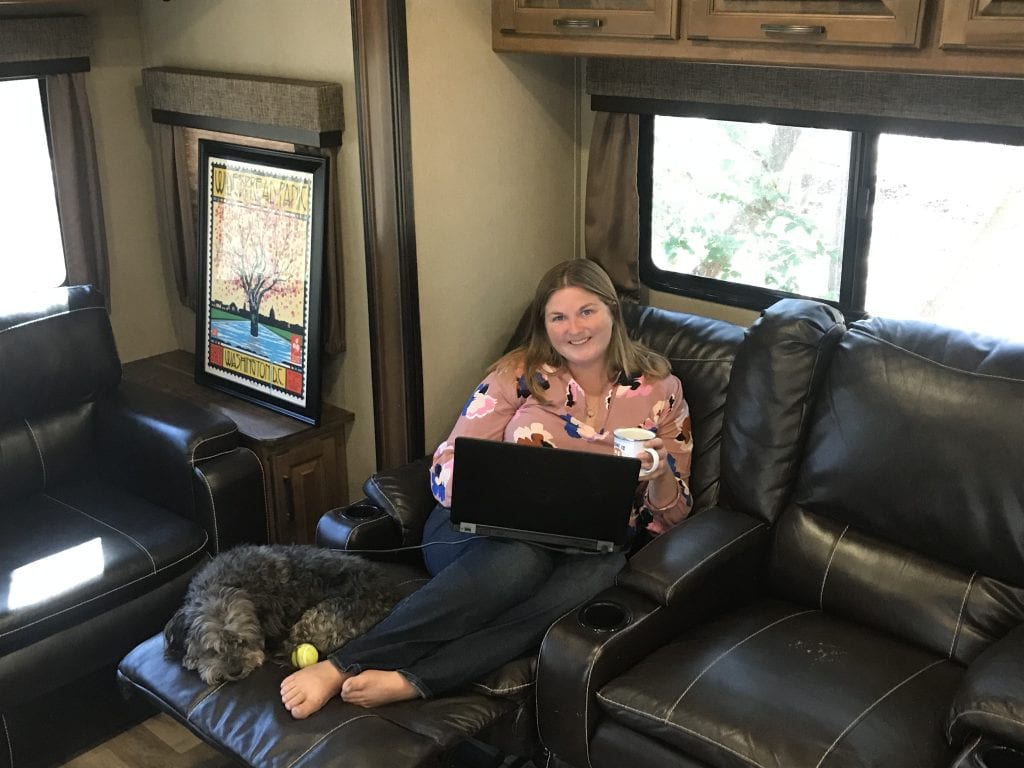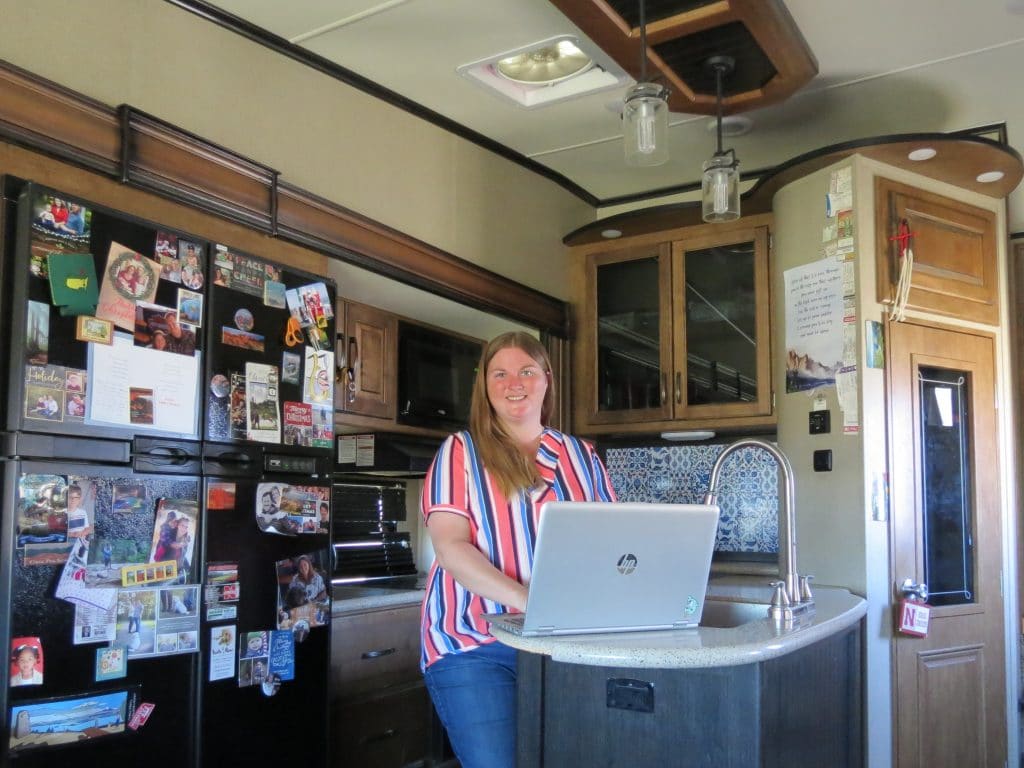
This is a guest post by Christina Pate, who travels full-time with her husband and dog Ted and documents her RV life lessons learned at TravelsWithTed.com.
There is a common misconception that you have to be an entrepreneur in order to travel full time. While being your own boss may make the transition into RV living simpler, you can absolutely hit the road with a normal job. For our first three years of RV life, I funded our travels with a full-time job at a market research firm. I worked forty to fifty hours per week from our RV living room and was able to obtain raises and promotions from the road. Below, I share my tips on how to find and keep telecommuting jobs while living a nomadic life.
How to Find Remote Work
Consider Keeping your Current Job
Your current company is a great place to start your search for remote work. Having a proven track record of success helps companies feel more at ease with the nontraditional arrangement.
Before approaching your manager with the request to work remotely, make sure you are prepared to address their concerns. Assure them you will have a strong internet connection and be willing to travel back to the office for important meetings. If there are aspects of your job, such as managing employees or meeting with clients, that are better suited for in-person work be prepared to discuss how you can handle these tasks remotely or transition them to another team member.
While many companies are open to hiring remote workers, not all managers will approve this request. Don’t discuss remote work with your manager until you are 100% sure that full time travel is in your future and you have a back-up plan in place.
Note from Lindsay and Dan: We love this tip! Dan actually did this, which allowed us to hit the road. During the interview process, when it was his turn to ask questions, he asked about the possibility of working remote and they agreed. You don’t know if you don’t ask. It also helps to research the company ahead of time to determine if they are remote work friendly!

Applying for Remote Jobs
If your current company does not allow remote work or if your current job is not suited for telecommuting, then it is time to find a new job or career. For workers who spend most of their time at a computer or on the phone, you can continue to search for positions in your current field. If your current career is impossible from the road, then look for entry-level positions across different industries that have telecommuting opportunities.
There are several websites devoted to telecommuting job listings. FlexJobs and We Work Remotely are both great job board sites that exclusively list location-flexible positions.
However, you should not limit your search to jobs that are listed as telecommuting positions. Apply to any job that you would be great at regardless of your location. Mention the requirement to be able to telecommute at the end of the interview, not in a cover letter or e-mail. You want to prove you are the best candidate for the position before negotiating your work location.
Note from Lindsay and Dan: Our favorite website for finding telecommuting jobs is Virtual Vocations. Lindsay has connected with the co-founder and CEO, Laura and was so impressed by her dedication to provide the best services for people looking for remote work. They hand-screen each job lead to ensure it’s legitimate, which is awesome because if you’ve done any of your own searching you know there are a lot of scams out there to sort through. With over 60 career categories and jobs ranging from entry to executive level, you’re sure to find the right fit for you!
Not even sure how to begin looking for a remote job? Perhaps you’ve been in the same career for several years and you’re not even sure how your skills will translate to the remote job world. Lindsay’s been there, as a former Kindergarten teacher!
We can’t recommend our friend Camille’s course, Remote Work 101 enough. It’s a self-paced online training that will help you build confidence in your skill sets, update your resume accordingly, prepare for interviewing, navigate internet connectivity, and more! Camille has personally coached us in a lot of ways throughout our entrepreneurial journey and she is truly talented at what she does!
How to Maintain Professionalism on the Road
The keys to maintaining professionalism and excelling in your career while living in an RV are a quiet work space and a strong internet connection.
Creating a Quiet Work Space
A quiet work space where you can focus and take professional calls is a necessity for telecommuting from an RV. I was able to work from our living room, but insisted my husband was quiet or outside during office hours. If you have children or two people who will be telecommuting, consider purchasing an RV with a bunk-room or garage that can be turned into an office. Most toy hauler RV models have a garage that can easily be converted into a private work space.
When purchasing an RV, also consider the type of work space you require. I was comfortable working from our couch the majority of my day, and used our kitchen island as a standing desk when I need to stretch out a bit. If you prefer a more traditional desk, consider an RV with a dinette table that can be used as your work surface.
You should also book campgrounds that will have limited outside noise. When selecting your site at each campground, look for sites that are away from the road and not close to the pool, playground or other group amenities. Wear headphones with a microphone for any business calls to ensure clients cannot hear noises from your neighbors. Also, turn off the loud RV air conditioner before answering any calls.

Note from Lindsay and Dan: If you’re interested in renovating your RV to design the perfect work space for you, our go-to site for RV interior design and renovations is RVInspiration.com. The site owner, and our friend, Ashley also wrote a few awesome books/guides for painting your RV, creating more space, increasing your storage options, and even decorating!
Ensure a Strong Internet Connection
A reliable internet connection is essential for most telecommuting jobs. My remote job required a very strong connection as I often had to participate in video calls with clients and colleagues. The Mobile Internet Resource Center has a great guide on all RV internet options.
Most full-time RVers, use mobile hotspot plans to ensure they have a reliable connection at every destination. If you are using a mobile hotspot, check the cellular provider’s coverage map before making any reservation. Never rely on campground Wi-Fi for your job. Most RV parks offer only low speed Wi-Fi and we have stayed at several RV parks where the Wi-Fi did not work at all.
Note from Lindsay and Dan: We agree! Good Wi-Fi is critical if you’re working remotely and especially if you’re on the road. Do not rely on RV park’s internet. We love the book, The Mobile Internet Handbook, will provide you with everything you need to know. WeBoost and Winegard offer helpful product for boosting signal too!
How to Maximize your Adventure
Once you’ve landed a remote job and hit the road, the real fun begins! Although your life of travel will be awesome, working a full-time job limits the time you have to explore. Travel slow and utilize time differences to make the most of your adventure and avoid travel burnout.
Travel Slow
If your job requires you to work forty or more hours per week, plan to stay at least three to four weeks at each destination. This will give you ample time to explore an area on nights and weekends. As an added bonus, many RV parks offer discounts for monthly stays, so you will have more money for activities and date nights. While you may feel rushed to see many places, traveling slow is a rewarding experience that allows you to build a connection with every new town or destination you visit.
Utilize Time Differences
Plan to work on one time zone and then utilize the time difference to have more daylight hours off work. I always worked on Eastern time regardless of my location. When we were parked in the western half of the country, I was able to log-off by early afternoon. This allowed us to go on many weekday hikes and visit popular attractions on less busy days. Alternatively, working on Pacific or Mountain time, you could wake up early on the east coast and have to explore before the workday begins.
If you are considering RV living, you don’t have to wait. Start applying for jobs today and your dream will be a reality before you know it!
What questions do you have about finding and maintaining remote work?
Let us know in the comments and we’ll respond back!
Related Posts:
How I’m Earning an Income While Traveling Full-Time (+ Tips For YOU!)



